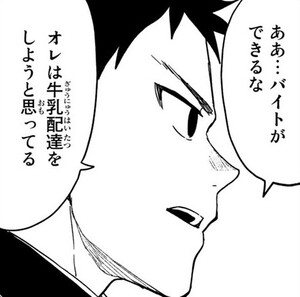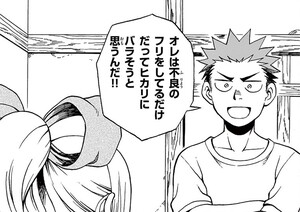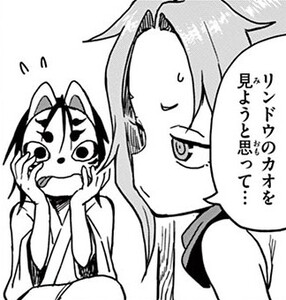Thinking of doing with 〜ようと思う
Grammar: Intention » 〜ようと思う
A volitional verb (〜おう or 〜よう) followed by 〜と思う expresses the speaker’s intention or decision to do something. It often conveys a relatively casual or soft plan, rather than a firm commitment.
Usage
This is often used when the decision is made just now, or when announcing what you intend to do. It sounds a bit softer and less absolute than 〜た+つもり. When a plan is held over time (not decided just now), 〜ようと思っている is used.
It is usually only used to express the speaker’s own intentions.
Further Reading
- う・よう + と思おもう (bunpro.jp)
- 「~ようと思っています」「~つもりです」は何が違う?|日本語文法の基礎知識 (tanosuke.com)
- 【N4文法】~(よ)うと思う (mainichi-nonbiri.com)
- ~ようと思う【JLPT N4文法】 (irasuto-nihongo.com)
Examples
Thinking of delivering milk with 〜ようと思う

Takeru and Ayumu talk about now being in high school.
- 歩:
- 「ああ…バイトができるな」
- “Yeah, I can get a part-time job.”
- 「オレは牛乳配達をしようと思ってる」
- “I'm thinking of doing milk delivery.”
Thinking of revealing the truth with 〜ようと思う

Kenji thinks Kyouko is upset because he and Hikari don’t get along well.
- ケンジ:
- 「オレは不良のフリをしてるだけだってヒカリにバラそうと思うんだ!!」
- “I think I will reveal to Hikari that I'm just pretending to be a delinquent!”
Thought I would see her face with 〜ようと思う

Seeing Rindou asleep, Sazanka reaches for her mask. Rindou wakens and backs away. Tsubaki asks what they’re doing so early in the morning.
- サザンカ:
- 「リンドウのカオを見ようと思って…」
- “I thought I would see Rindou's face...”